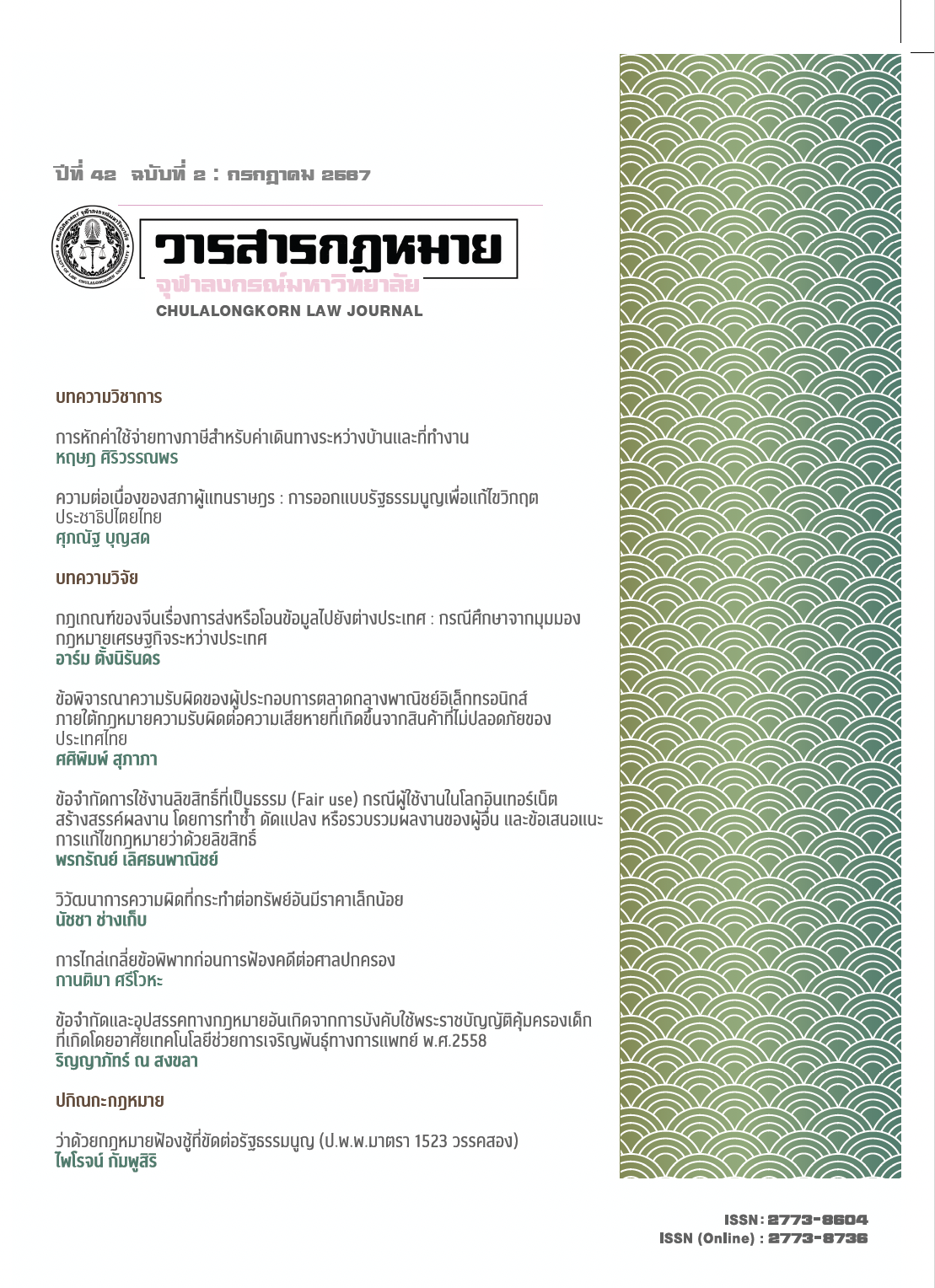การไกล่เกลี่ยข้อพิพาทก่อนการฟ้องคดีต่อศาลปกครอง
Main Article Content
บทคัดย่อ
การวิจัยนี้มีวัตถุประสงค์เพื่อ (1) ศึกษาแนวคิดและทฤษฎีเกี่ยวกับการไกล่เกลี่ยข้อพิพาทและการไกล่เกลี่ยข้อพิพาทในคดีปกครอง (2) ศึกษากฎหมายเกี่ยวกับการไกล่เกลี่ยข้อพิพาทในคดีปกครอง
ตามพระราชบัญญัติจัดตั้งศาลปกครองและวิธีพิจารณาคดีปกครอง พ.ศ. 2542 และการไกล่เกลี่ยข้อพิพาทก่อนการฟ้องคดีตามกฎหมายไทยและกฎหมายต่างประเทศ ได้แก่ สาธารณรัฐฝรั่งเศส และเครือรัฐออสเตรเลีย (3) ศึกษาปัญหาเกี่ยวกับความเหมาะสมในการนำวิธีการไกล่เกลี่ยข้อพิพาททางปกครองก่อนฟ้องคดีมาใช้ในศาลปกครองของประเทศไทย (4) เสนอแนะมาตรการทางกฎหมายในการกำหนดหลักเกณฑ์และวิธีการไกล่เกลี่ยข้อพิพาทก่อนฟ้องคดีต่อศาลปกครอง ผลการศึกษาพบว่า ตามแนวคิดและทฤษฎีเกี่ยวกับการไกล่เกลี่ยข้อพิพาทในคดีปกครอง ได้ให้ความสำคัญกับการไกล่เกลี่ยข้อพิพาทซึ่งเป็นการระงับข้อพิพาททางเลือกโดยการไกล่เกลี่ยข้อพิพาทในคดีปกครองจะต้องคำนึงถึงหลักความชอบด้วยกฎหมายของการกระทำทางปกครอง และหลักการคุ้มครองประโยชน์สาธารณะ ซึ่งเป็นหลักการพื้นฐานของกฎหมายปกครอง การไกล่เกลี่ยข้อพิพาทในคดีปกครองจึงต้องพิจารณาถึงข้อจำกัดอำนาจของฝ่ายปกครอง และพิจารณาถึงผลกระทบต่อประโยชน์สาธารณะประกอบด้วย โดยกฎหมายต่างประเทศ ได้แก่ สาธารณรัฐฝรั่งเศส และเครือรัฐออสเตรเลีย มีบทบัญญัติที่ชัดเจนในการไกล่เกลี่ยข้อพิพาทก่อนฟ้องคดีปกครองต่อศาล ซึ่งกฎหมายไทยมีบทบัญญัติเกี่ยวกับการไกล่เกลี่ยข้อพิพาทในคดีปกครอง แต่บทบัญญัติที่มีอยู่ไม่สามารถดำเนินการไกล่เกลี่ยข้อพิพาทก่อนฟ้องคดีต่อศาลปกครองได้ สำหรับกฎหมายของสาธารณรัฐฝรั่งเศสกำหนดให้สามารถไกล่เกลี่ยข้อพิพาทก่อนที่จะมีการฟ้องคดีต่อศาลปกครองได้ โดยคู่กรณีเป็นผู้ริเริ่มให้มีการไกล่เกลี่ยและเป็นผู้เลือกผู้ไกล่เกลี่ย
ข้อพิพาทเอง หรือจะร้องขอต่ออธิบดีศาลปกครองชั้นต้นที่มีอำนาจในการพิจารณาคดีให้แต่งตั้งผู้ไกล่เกลี่ยข้อพิพาท ส่วนกฎหมายของเครือรัฐออสเตรเลียกำหนดให้คู่กรณีร้องขอต่อศาลเพื่อให้มีคำสั่งส่งการพิจารณาคดีไปยังผู้ไกล่เกลี่ยเพื่อดำเนินการระงับข้อพิพาทโดยการไกล่เกลี่ย ซึ่งเป็นการดำเนินการไกล่เกลี่ยก่อนฟ้องคดีปกครอง จึงสมควรแก้ไขเพิ่มเติมบทบัญญัติในพระราชบัญญัติจัดตั้งศาลปกครองและวิธีพิจารณาคดีปกครอง พ.ศ. 2542 ให้นำวิธีการไกล่เกลี่ยข้อพิพาทมาใช้ในคดีปกครองก่อนฟ้องคดีต่อศาลปกครองได้
Article Details

อนุญาตภายใต้เงื่อนไข Creative Commons Attribution-NonCommercial-NoDerivatives 4.0 International License.
ลิขสิทธิ์และเนื้อหาในเว็บไซต์ของวารสารกฎหมาย (รวมถึง โดยไม่จำกัดเฉพาะ เนื้อหา รหัสคอมพิวเตอร์ งานศิลป์ ภาพถ่าย รูปภาพ ดนตรีกรรม โสตทัศนวัสดุ) เป็นกรรมสิทธิ์ของวารสารกฎหมาย และผู้ได้รับการโอนสิทธิทุกราย
1. วารสารกฎหมาย ให้อนุญาตให้คุณใช้สิทธิอันไม่เฉพาะเจาะจงที่สามารถถูกถอนเมื่อใดก็ได้ โดยไม่มีค่าใช้จ่าย ในการ
- เยี่ยมชมเว็บไซต์และเอกสารในเว็บไซต์นี้ จากคอมพิวเตอร์หรือเครื่องมือสื่อสารผ่านเว็บบราวเซอร์
- คัดลอกและจัดเก็บเว็บไซต์และเอกสารในเว็บไซต์นี้บนลงคอมพิวเตอร์ของคุณผ่านระบบความจำ cache
- สั่งพิมพ์เอกสารจากเว็บไซต์นี้สำหรับการใช้ส่วนตัวของคุณ
- ผลงานที่ได้รับการตีพิมพ์โดยวารสารกฎหมาย จุฬาลงกรณ์มหาวิทยาลัย ถูกคุ้มครองภายใต้ Creative Commons Attribution 4.0 International License ซึ่งอนุญาตให้ทุกคนสามารถคัดลอก แจกจ่าย ดัดแปลง ส่งต่อ ผลงานได้ ก็ต่อเมื่อผลงานและแหล่งข้อมูลได้รับการอ้างอิงอย่างเหมาะสม
2. วารสารกฎหมาย จุฬาลงกรณ์มหาวิทยาลัย สงวนสิทธิ์ไม่อนุญาตให้คุณใช้สิทธิอื่นใดที่เกี่ยวข้องกับเว็บไซต์และเอกสารบนเว็บไซต์นี้ เช่น การคัดลอก ดัดแปลง เปลี่ยนแปลง ส่งต่อ ตีพิมพ์ แจกจ่าย เผยแพร่ จัดแสดงในที่สาธารณะ ไม่ว่าจะในรูปแบบใดก็ตาม ซึ่งเว็บไซต์หรือเอกสารบนเว็บไซต์ โดยไม่อ้างอิงถึงแหล่งข้อมูลหรือโดยไม่ได้รับอนุญาตเป็นลายลักษณ์อักษรจากวารสารกฎหมาย จุฬาลงกรณ์มหาวิทยาลัย
3. คุณอาจขออนุญาตที่จะใช้เอกสารอันมีลิขสิทธิ์บนเว็บไซต์นี้โดยการเขียนอีเมลล์มายัง journal@law.chula.ac.th
4. วารสารกฎหมาย จุฬาลงกรณ์มหาวิทยาลัย เข้มงวดกับการคุ้มครองลิขสิทธิ์อย่างมาก หากวารสารกฎหมาย จุฬาลงกรณ์มหาวิทยาลัยพบว่าคุณได้ใช้เอกสารอันมีลิขสิทธิ์บนเว็บไซต์นี้โดยไม่ถูกต้องตามการอนุญาตให้ใช้สิทธิ ดังที่กล่าวไปข้างต้น วารสารกฎหมาย จุฬาลงกรณ์มหาวิทยาลัยอาจดำเนินคดีตามกฎหมายต่อคุณได้ เพื่อเรียกร้องค่าเสียหายที่เป็นตัวเงินและคำขอชั่วคราวให้คุณหยุดการใช้เอกสารดังกล่าว ทั้งนี้ คุณอาจถูกสั่งให้ชดใช้ค่าใช้จ่ายใดๆ ที่เกี่ยวข้องกับการดำเนินการตามกฎหมายนี้
หากคุณพบเห็นการใช้เอกสารอันมีลิขสิทธิ์ของวารสารกฎหมาย จุฬาลงกรณ์มหาวิทยาลัย ที่ขัดหรืออาจขัดต่อการอนุญาตให้ใช้สิทธิดังที่ได้กล่าวไปข้างต้น โดยเชื่อว่าได้ละเมิดลิขสิทธิ์ของคุณหรือของผู้อื่น สามารถร้องเรียนมาได้ที่ journal@law.chula.ac.th
เอกสารอ้างอิง
Civil Dispute Resolution Act 2011 (Cth)
Décret n° 2017-566 du 18 avril 2017 relatif à la médiation dans les litiges relevant de la compétence du juge administratif, R. 213-1
Décret n° 2017-566 du 18 avril 2017 relatif à la médiation dans les litiges relevant de la compétence du juge administratif, R. 213-2
Décret n° 2017-566 du 18 avril 2017 relatif à la médiation dans les litiges relevant de la compétence du juge administratif, R. 213-3
Décret n° 2017-566 du 18 avril 2017 relatif à la médiation dans les litiges relevant de la compétence du juge administratif, R. 213-9
Décret n° 2018-654 du 25 juillet 2018 modifiant le décret n° 2018-101 du 16 février 2018 portant expérimentation d'une procédure de médiation préalable obligatoire en matière de litiges de la fonction publique et de litiges sociaux
L. 213-3 du Code de justice administrative
L. 213-4 du Code de justice administrative
L. 213-5 du Code de justice administrative
L. 213-6 du Code de justice administrative
Rule 28.01 of Federal Court Rule 2011
Rule 28.02 of Federal Court Rule 2011
Rule 28.03 of Federal Court Rule 2011
Rule 28.21 of Federal Court Rule 2011
Rule 28.22 of Federal Court Rule 2011
Rule 28.24 of Federal Court Rule 2011
Rule 28.25 of Federal Court Rule 2011
กรรณิกา สุทธิประสิทธิ์ และคณะ, สรุปผลการสัมมนาหัวข้อ “การไกล่เกลี่ยข้อพิพาทในศาลปกครองฝรั่งเศส” โครงการพัฒนาความรู้ตุลาการศาลปกครอง เรื่อง การนำวิธีระงับข้อพิพาททางเลือก (ADR) มาใช้กับคดีเกี่ยวกับสิ่งแวดล้อมในศาลปกครอง, (กรุงเทพมหานคร: บริษัท พี เพรส จำกัด, 2554)
ข้อ 18 ระเบียบของที่ประชุมใหญ่ตุลาการในศาลปกครองสูงสุดว่าด้วยการไกล่เกลี่ยข้อพิพาทในคดีปกครอง พ.ศ. 2562
ข้อ 24 ระเบียบของที่ประชุมใหญ่ตุลาการในศาลปกครองสูงสุดว่าด้วยการไกล่เกลี่ยข้อพิพาทในคดีปกครอง พ.ศ. 2562
ข้อ 31 และข้อ 32 ระเบียบของที่ประชุมใหญ่ตุลาการในศาลปกครองสูงสุดว่าด้วยการไกล่เกลี่ยข้อพิพาทในคดีปกครอง พ.ศ. 2562
คำสั่งศาลปกครองกลาง คดีหมายเลขดำที่ 1047/2558 คดีหมายเลขแดงที่ 206/2551
ชาญชัย แสวงศักดิ์, คำอธิบายกฎหมายปกครอง, พิมพ์ครั้งที่ 30 (กรุงเทพมหานคร: วิญญูชน, 2564)
ชุติมา ภูบุญเต็ม. การไกล่เกลี่ยข้อพิพาทในศาลปกครองศึกษากรณีการชดใช้ค่าสินไหมทดแทนเกี่ยวกับความรับผิดทางละเมิดแก่หน่วยงานทางปกครอง. สารนิพนธ์ปริญญามหาบัณฑิต คณะนิติศาสตร์ มหาวิทยาลัยศรีปทุม, 2562
ณัฐชานาฏ ฐิติภัค. การไกล่เกลี่ยคดีปกครองทางสิ่งแวดล้อม. วิทยานิพนธ์ปริญญามหาบัณฑิต คณะนิติศาสตร์ มหาวิทยาลัยธุรกิจบัณฑิต, 2559
ดุษฎี อาลิแอ. ปัญหาทางกฎหมายเกี่ยวกับมาตรการไกล่เกลี่ยในกระบวนการพิจารณาคดีปกครองของศาลปกครอง. สารนิพนธ์ปริญญามหาบัณฑิต คณะนิติศาสตร์ มหาวิทยาลัยศรีปทุม, 2560
ทัศนีย์ ไชยแสน. การไกล่เกลี่ยข้อพิพาทก่อนการฟ้องคดีศึกษากรณีคดีปกครองเกี่ยวกับสิ่งแวดล้อม. สารนิพนธ์ปริญญามหาบัณฑิต คณะนิติศาสตร์ มหาวิทยาลัยศรีปทุม, 2564
เทียนเงิน อุตระชัย, การไกล่เกลี่ยข้อพิพาททางปกครองก่อนการฟ้องคดี: กรณีศึกษาประเทศออสเตรเลีย, (เอกสารไม่ตีพิมพ์เผยแพร่)
นาตาชา วศินดิลก ผลพฤกษ์. ปัญหาทางกฎหมายเกี่ยวกับการไกล่เกลี่ยข้อพิพาททางปกครองโดยศาลปกครอง. วิทยานิพนธ์ปริญญามหาบัณฑิต สาขากฎหมายมหาชน คณะนิติศาสตร์ มหาวิทยาลัยธรรมศาสตร์, 2557
นายฉัตรชัย นิติภักดิ์, การไกล่เกลี่ยคดีปกครอง, โครงการเสริมสร้างความรู้ ทักษะ และความชํานาญงาน ของพนักงานคดีปกครองและบุคลากรของสํานักงานศาลปกครองเพชรบุรี กิจกรรมเสวนาแลกเปลี่ยนเรียนรู้ระหว่างตุลาการกับพนักงานคดีปกครอง และบุคลากรที่เกี่ยวข้อง, 17 ธันวาคม 2563 (เอกสารไม่ตีพิมพ์เผยแพร่)
บวรศักดิ์ อุวรรณโณ, กฎหมายมหาชน เล่ม 3 : ที่มาและนิติวิธี, (กรุงเทพมหานคร: นิติธรรม, 2538)
มาตรา 66/11 พระราชบัญญัติจัดตั้งศาลปกครองและวิธีพิจารณาคดีปกครอง พ.ศ. 2542
มาตรา 66/2 พระราชบัญญัติจัดตั้งศาลปกครองและวิธีพิจารณาคดีปกครอง พ.ศ. 2542
มาตรา 66/4 พระราชบัญญัติจัดตั้งศาลปกครองและวิธีพิจารณาคดีปกครอง พ.ศ. 2542
มาตรา 66/4 วรรคสอง พระราชบัญญัติจัดตั้งศาลปกครองและวิธีพิจารณาคดีปกครอง พ.ศ. 2542
มาตรา 66/5 พระราชบัญญัติจัดตั้งศาลปกครองและวิธีพิจารณาคดีปกครอง พ.ศ. 2542
มาตรา 66/9 พระราชบัญญัติจัดตั้งศาลปกครองและวิธีพิจารณาคดีปกครอง พ.ศ. 2542
รัตนลักษณ์ นาถนิติธาดา. การไกล่เกลี่ยคดีปกครองโดยศาลปกครอง. วิทยานิพนธ์ปริญญามหาบัณฑิต คณะนิติศาสตร์ มหาวิทยาลัยธรรมศาสตร์, 2551
วรพจน์ วิศรุตพิชญ์, ข้อความคิดและหลักการพื้นฐานบางประการของกฎหมายปกครอง, พิมพ์ครั้งที่ 3 (กรุงเทพมหานคร: วิญญูชน, 2562)
วรินทร ชยวัฑโฒ. การไกล่เกลี่ยข้อพิพาทคดีสิ่งแวดล้อมในศาลปกครอง. วิทยานิพนธ์ปริญญามหาบัณฑิต คณะนิติศาสตร์ มหาวิทยาลัยสุโขทัยธรรมาธิราช, 2555
วิศรุต คิดดี, การไกล่เกลี่ยข้อพิพาทแบบบังคับก่อนการฟ้องคดีปกครองในประเทศฝรั่งเศส, (เอกสารไม่ตีพิมพ์เผยแพร่)
วิสสุดา คชกฤษ. การไกล่เกลี่ยข้อพิพาท ศึกษากรณีบุคคลภายนอกที่ทำหน้าที่เป็นผู้ไกล่เกลี่ยข้อพิพาทในคดีปกครอง. วิทยานิพนธ์ปริญญามหาบัณฑิต คณะนิติศาสตร์ มหาวิทยาลัยศรีปทุม, 2563
สำนักงานเลขาธิการสภาผู้แทนราษฎร, “รวมบทความทางวิชาการ เล่ม 4 กฎหมายปกครองต่างประเทศ” [ออนไลน์] แหล่งที่มา : https://dl.parliament.go.th/handle/20.500.13072/301255. [1 มิถุนายน 2566]
สำนักวิจัยและวิชาการ สำนักงานศาลปกครอง, การไกล่เกลี่ยข้อพิพาททางปกครองก่อนฟ้องคดี, (เอกสารไม่ตีพิมพ์เผยแพร่)
สำนักวิจัยและวิชาการสำนักงานศาลปกครอง, พัฒนาการของการไกล่เกลี่ยข้อพิพาทในคดีปกครองของศาลปกครองไทยระหว่างปี พ.ศ. 2543 ถึง พ.ศ. 2558, (กรุงเทพมหานคร: โรงพิมพ์บริษัทประชาชนจำกัด, 2558)
สุขฉวี รักตประจิต, “การไกล่เกลี่ยและน้อมข้อพิพาทในคดีปกครอง: ประสบการณ์ของศาลและองค์กรวินิจฉัยข้อพิพาทของประเทศออสเตรเลีย”, วารสารวิชาการศาลปกครอง, 19, 3 (2562): 96.
สุริยา ปานแป้น และอนุวัฒน์ บุญนันท์, คู่มือสอบกฎหมายปกครอง, พิมพ์ครั้งที่ 11, (กรุงเทพมหานคร: วิญญูชน, 2561)
อภิญญา แก้วกำเหนิด, ประเทศฝรั่งเศสประกาศใช้กฎหมายนำร่องให้มีการนำกระบวนการไกล่เกลี่ยข้อพิพาททางปกครองแบบบังคับมาทดลองใช้สำหรับคดีบางประเภท, (เอกสารไม่ตีพิมพ์เผยแพร่)
อมรรัตน์ อำมาตเสนา. ความเหมาะสมของการนำวิธีการไกล่เกลี่ยมาใช้ในการระงับข้อพิพาททางปกครองในศาลปกครอง. วิทยานิพนธ์ปริญญามหาบัณฑิต คณะนิติศาสตร์ สถาบันบัณฑิตพัฒนบริหารศาสตร์, 2562
อำพน เจริญชีวินทร์, คำอธิบายการฟ้องและการดำเนินคดีในศาลปกครอง ภาค 1 เขตอำนาจศาล, พิมพ์ครั้งที่ 7 (กรุงเทพมหานคร: นิติธรรม, 2566)
อุกฤษฏ์ ตัณตรีบูรณ์. การไกล่เกลี่ยข้อพิพาทในคดีสัญญาทางปกครองโดยศาลปกครอง. การศึกษาค้นคว้าอิสระปริญญามหาบัณฑิต คณะนิติศาสตร์ มหาวิทยาลัยสุโขทัยธรรมาธิราช, 2558


